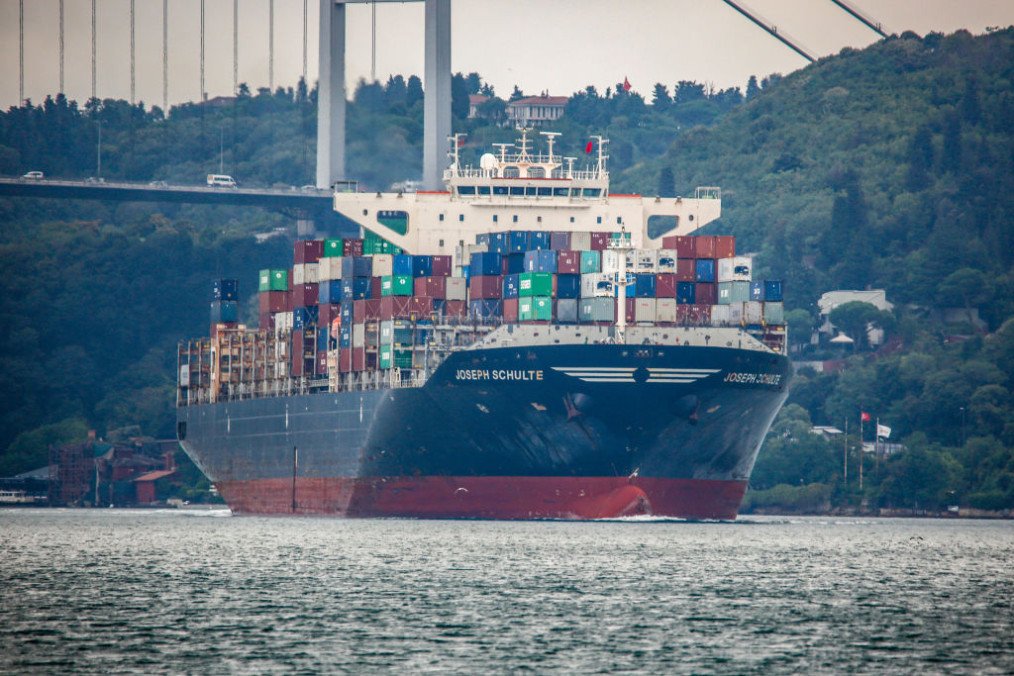- Category
- Latest news
Ukrainian Corridor Marks One Year of Successful Exports Ensuring Global Food Security

On August 16, Ukraine commemorates the first year of the resumption of its grain exports through a temporary sea route, a critical lifeline established in defiance of Russia’s naval blockade imposed since the Russian full-scale invasion in February 2022.
Exactly one year ago today, the first civilian vessel, “Joseph Schulte”, successfully navigated through the temporary sea route established by the Ukrainian Naval Forces, marking a pivotal moment in Ukraine’s maritime export history. This route, now known as the “Ukrainian Corridor,” has played a critical role in sustaining global food supplies amid ongoing Russian aggression.
Despite facing constant threats and attacks from Russian forces, over the past year, 2,379 ships have used the Ukrainian Corridor to export goods to 46 countries, resulting in a total cargo turnover of 64.4 million tons, including 43.5 million tons of agricultural products from Ukrainian farmers.
By comparison, during the 12 months of the Black Sea Grain Initiative (July 2022 — July 2023), only 730 ships passed through the Black Sea. Ukraine’s temporary sea route has facilitated the departure of 3.2 times more ships and has enabled the export of nearly 25% more agricultural products than the grain corridor under the Black Sea Grain Initiative.
The Black Sea Grain Initiative (or the Initiative on the Safe Transportation of Grain and Foodstuffs from Ukrainian ports commonly called the grain deal) was an agreement among Russia, Ukraine, Turkey, and the United Nations during the first year of the illegal Russian invasion of Ukraine.
Ukraine’s efforts have been instrumental in stabilizing global food prices and preventing a food crisis that could have impacted hundreds of millions of people. The country has solidified its position as a crucial guarantor of global food security.
Beyond commercial exports, Ukraine has initiated the “Grain from Ukraine” humanitarian program, aligned with President Zelenskyy’s vision. This initiative has already delivered 1,000 tons of flour to Palestine, benefiting 100,000 people, and 500 tons of vegetable oil to Mauritania. Additional aid is planned for Malawi and Zambia.
Ukraine’s robust food export operations and the Grain From Ukraine program have become integral components of the nation’s foreign policy, underscoring its commitment to global humanitarian efforts even amid full-scale war. This approach also carries deep historical significance for Ukraine, as it contrasts with the Holodomor of 1932-1933, during which the Stalinist regime attempted to starve the Ukrainian people into submission.
“The Ukrainian Corridor is more than just a temporary sea route; it represents our path to victory and economic recovery, as well as a guarantee of global food security. I extend my deepest gratitude to everyone who ensures the operation of this crucial route—our military, port workers, sailors, logisticians, and international partners. Your tireless efforts form the backbone of our economic resilience and bolster our standing on the world stage,” said Vasyl Shkurakov, Acting Minister of Community Development, Territories, and Infrastructure.
Despite Russia’s blockade of Ukrainian seaports, which began with its full-scale invasion in February 2022, Ukraine independently resumed its sea exports, with the Defense Forces guaranteeing the safety of the temporary sea route from the ports of Odesa.
The operation was further supported by agreements with leading British insurance companies, which provided a special ship insurance program, allowing trade to resume.
This strategy is also relevant across other areas of international relations, particularly in long-range military strikes on Russian territory, the implementation of Ukraine’s Peace Formula, and the pursuit of a just peace based on the principles of the UN Charter.
-ba02b3bc86f0b624f99115809a6a34d0.jpg)






